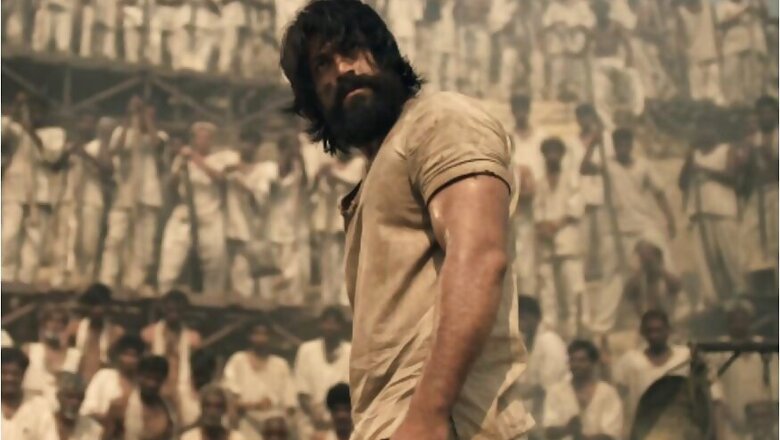
views
Fight it out, to find favour in the Hindi belt – that’s the formula Kannada filmmakers have zeroed in on, for a successful box office run, after seeing that many of their films find good audiences and sell well in north Indian states like Uttar Pradesh, Bihar and Madhya Pradesh.
As the language debate rages on in south India about how Hindi should not be imposed on school children, there is a different Hindi connect that Kannadigas are making with Hindi – Many Kannada films are finding a good market once they are dubbed in Hindi, as long as they have enough action and fighting sequences. In fact, some directors say even films that don’t do well in Karnataka make reasonably-enough money up north.
Recent films like KGF: Chapter 1, Kiccha, El Dorado and Chandra and many others have found many takers after being dubbed into Hindi or other regional languages.
"See we have 2 kinds of audiences – the ‘multiplex audiences’ who follow movies which are not necessarily action-oriented and ‘non-multiplex audiences’ who would like to see something 'big' happen and find action sequences the most interesting part of any film. So these riveting action films are being dubbed and enjoyed by north-Indian states such as the north east, Mumbai, UP and MP,” says Pushkara Mallikarjunaiah, who heads production house Pushkar Films known for movies such as Godi Banna, Saadarana Maikattu.
His next film Avane Srimannarayana is getting dubbed in four languages before its scheduled release in August.
“Every society has its own sector of people; north-India has its own taste for mass action films,” says film writer, screen-writer and director Santosh Ananddram.
Dubbed Kannada movies were seen as a threat to local culture. But now, trends are changing the perspectives of film-makers. Kannada films are being dubbed in Tamil, Malayalam, Telugu, Hindi, Marathi and Bengali. Post 2017, all south films have raised their bars and are attracting Hindi audiences. Most of the Hindi versions of Kannada films are found on Set Max. The quality of voices in the dubbed films has improved tremendously because of high demand for these films.
Kannada films are also seen more on television in their Hindi avatars.
The set template these days is that any Kannada film has at least three fights – in fact, stunt masters have started commanding more money purely because of this.
Ananddram says Kannada films dubbed into other languages sell best in Maharashtra, UP and Bihar. “Viewer percentage of our action films in the north is more than 60% otherwise big guys wouldn’t take our films into the Hindi belt. The minimum number of fight sequences that should be there is 3 and maximum is 5. Because if it is more than 5 with the same presentation, that takes place multiple times, people will get bored. Action plays a major role but it should be coined and portrayed in the right way.”
A national-award winning producer says the audience that goes to a multiplex also thinks of the other add-on costs like parking, food, etc, at the mall. “Nowadays, unless the film or the film songs are a big hit, people think twice before going to the theatre since Netflix or Amazon turns out cheaper and more convenient,” he says.
Under the circumstances, even Kannada films with top heroes have flopped. “They sell these to channels and then push the film into the Hindi belt. Eventually they find a good number of Hindi/Bhojpuri/North-Indian viewers. If there are at least three to four fights, then the movies make for good entertainment and many watch in north India.”
Ravi Varma, a stunt-master for many Kannada, Telugu, Tamil and Hindi films, says they come up with different stunts and fight sequences based on every story-line.
“Some people enjoy a natural setting while others enjoy watching heroism. Each story demands a different type of action sequence or stunts. We come up with rip-roaring fight sequences and stunts in order to please the audience after understanding the crux of the story."
Each story requires the use of different props. Coconuts, lights, pans, pots, sugarcane sticks etc. are used to enhance the storyline – depending on what is available in the natural setting in that point of the story.
“If the scene is based in a village or an open ground, we resort to using ropes, sickles, trees, coconuts, cars, rods, bamboo sticks etc. Fake glass can also be used as a prop for action. In the indoor setting, things like fans, chairs, tables, knives, guns, pots, pans wood etc is used. Each scene calls for the use of different but appropriate props,” Varma says.
The release of KGF on 21st December, 2018, which became a superhit, also changed drastically the way Kannada films are seen. “No other film made such a huge deal in the film industry. This movie got people's attention to the Sandalwood film industry,” says Adarsh Eshwarappa, a director.
People all over India wanted to watch KGF in various languages and is the most-viewed Kannada film with 8.3 stars.
Ananddram says the diverse genres of films in Kannada also seems to have clicked in the north. "Bollywood films stopped catering to north-Indians, because of their greater focus on the story and less action. They mostly have monotonous content or similar story-line. Kannada films offer variety (thrillers, mysteries, romances – all of it, with some amount of action.) This is of the reasons why south is getting its own recognition these days." said Santhosh Ananddram.
Former president of the Karnataka Film Chamber of Commerce KV Chandrashekar says the additional advantage is that it is quite inexpensive to dub Kannada movies to other languages. So this additional spend doesn’t burn a hole in anyone’s pocket.
As all of South India raises its voice against forcing Hindi on school children, Kannada films making a hit in north India should perhaps raise another movement – spread Kannada in the north!
(Witten by Nicole Serrao)
Follow @News18Movies for more



















Comments
0 comment